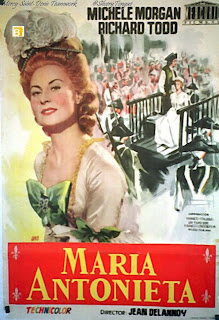Director: Jean Delannoy
Year: 1956
Rating:
6.5
Country: France
Aka - Shadow of the Guillotine
Poor Marie-Antoinette. History has dealt her a bad hand with much of it
based on the quote "Let them eat cake" which is actually better translated
as "Let them eat brioche". But in fact she never said this. That quote came
from a book about another Princess years before she even went to France. But
these things as we know - "I can not tell a lie, I cut the tree" - appeal
to the public fancy and tag along with you for years. At the same time this
quote from Marie-Antoinette has made her famous and remembered 230 years after
her unseemly death. And the subject of over 50 films. Even of late, there
was the Sofia Coppola 2006 film with Kirsten Dunst; the 2012 Farewell, My
Queen and The Affair of the Necklace in 2001 - a fascinating story in itself.
Even Jane Seymour played the Queen in La Revolution Francaise in 1989. The
1938 Norma Shearer MGM production is likely the most famous. Part of this
enduring interest I expect is the glamour of her life and the inevitable
dramatic march up the steps to the guillotine. Also, perhaps just to do
with our fascination for Royalty that we still see today in our lame obsession
for the English Monarchy.

Marie-Antoinette was - as was the custom of the day among royalty - made
part of a political pact between France and her country of Austria. In 1770
at the ripe old age of fourteen she was packed off to Paris to marry Louis
Auguste, the heir to the throne. He was sixteen. His father had died in
1765 making him the heir. Four years after their marriage, Louis XIV died
and he was proclaimed King of France. He too has received a bad rap from
history. Only 20 years old he attempted to implement numerous reforms abolishing
serfs, abolish land taxes - and of course he helped the American colonies
in their fight for Independence. But growing hostility to the aristocracy
and bad harvests began the inevitable road to the French Revolution. Film
has also not generally been generous to him either, portraying him
as a kind but muddling king more concerned about hunting than being a statesman.
He was of course to meet Mr. Guillotine a few weeks before his wife.

This film from director Jean Delannoy is a very sympathetic portrayal of
both Louis and Marie-Antoinette. There is a great deal of affection between
them though she found him dull and uninterested in the stylish life that
she enjoyed. So her attentions wandered elsewhere. To a Swiss soldier, the
Comte Axel von Fersen. Their friendship or love affair lasted for years though
he was often away on military matters. The film shies away from whether they
actually did the vertical tango but there are lots of words of love and
devotion. Fersen was a fascinating historical person in his own right. Sort
of a Zelig of the time. He was in contact with all the Kings of Europe,
he went to America to fight with the French and met Washington, he met Napoleon
after the Revolution and was part of the inner court of Louis XVI. It was
he who tried to lead the escape of Louis and Marie-Antoinette after they
had been imprisoned. He ended up back in Sweden in the 1800s where he became
the highest official in the country but had the bad luck of running into
an angry mob and being killed in 1811.

The film as one would expect is luxurious and ornate - spectacular costumes,
styles, hair, décor and buildings. You are not going to make a film
about Marie-Antoinette on the cheap. It does get bogged down somewhat in
the first half as it begins when she is married to Louis and not yet the
Queen and meets Fersen at a ball where he flirts with her not knowing who
she is. Later he meets her and they are soon an item of gossip. Lots of heated
romantic exchanges between the two. But he goes off to America. The film
picks up steam with the first stirrings of discontent and though we all know
how it is going to end it still manages to make it feel tragic.

Marie-Antoinette is portrayed by one of the great French actresses for
decades, the elegant Michèle Morgan. She had been a star since the
1930s, escaped to America during the war (Passage to Marseilles) and returned
to more accolades in France after the war. Fersen is played by the English
actor Richard Todd (not sure if he is being dubbed or not) with all the
romantic charm and good looks needed. He was at D-Day and in The Longest
Day he played his commander. He was also offered the role of James Bond
in Dr. No at the behest of Fleming but could not do it. That would perhaps
have changed film history.





